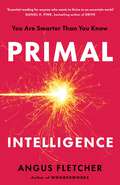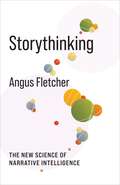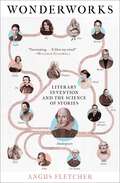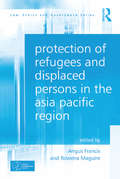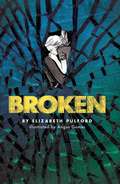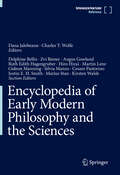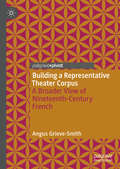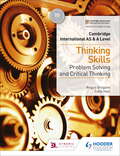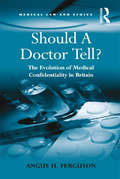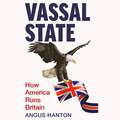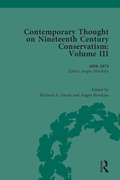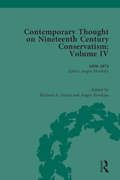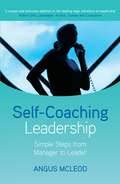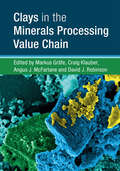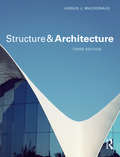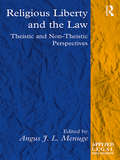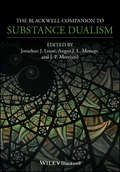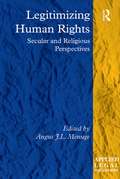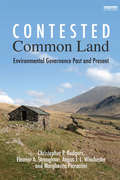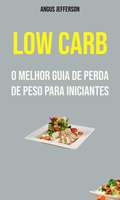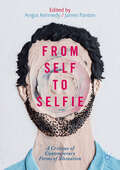- Table View
- List View
Primal Intelligence: You Are Smarter Than You Know
by Angus Fletcher'A fascinating exploration of human potential that will change how you think about thinking . . . Essential reading for anyone who wants to thrive in an uncertain world' DANIEL H PINKTap into your hidden intelligence and transform your lifeHow are some people so much smarter than the rest of us? In 2021, researchers at Ohio State's Project Narrative, renowned for collaborations with NASA, Hollywood and Silicon Valley, announced they had the answer. They named it Primal Intelligence. Intrigued, U.S. Army Special Operations developed Primal training for its most classified units. The training succeeded. The Operators saw the future faster. They healed quicker from trauma. In life-and-death situations, they chose wiser. The Army then authorized trials on civilian entrepreneurs, doctors, engineers, managers, salesforces, coaches, teachers, investors and NFL players. Their leadership and innovation improved significantly. They coped better with change and uncertainty. They experienced less anger and anxiety. Finally, the Army provided Primal training to college and K-12 classrooms. It produced substantial effects in students as young as eight. That revolutionary training is now available for the first time in this book. It is not an optimization hack or a cheat code. Primal Intelligence is a different way of using your brain. It offers a new neuroscientific approach to intuition, imagination, emotion and commonsense. It is your edge over AI. Your human genius. Your Primal Intelligence.
Storythinking: The New Science of Narrative Intelligence (No Limits)
by Angus FletcherEvery time we think ahead, we are crafting a story. Every daily plan—and every political vision, social movement, scientific hypothesis, business proposal, and technological breakthrough—starts with “what if?” Linking causes to effects, considering hypotheticals and counterfactuals, asking how other people will react: these are the essence of narrative. So why do we keep overlooking story’s importance to intelligence in favor of logic?This book explains how and why our brains think in stories. Angus Fletcher, an expert in neuroscientific approaches to narrative, identifies this capacity as “storythinking.” He demonstrates that storythinking is fundamental to what makes us human. Artificial intelligence can perform symbolic logic, rational deduction, and mathematical calculation, but it is incapable of deliberating in narrative. Drawing on new research in neuroscience and narrative theory, Fletcher explores the nature of imagination, innovation, and creativity. He provides concise answers to big questions: How does storythinking work? Why did it evolve? How can it misfire? What problems can it solve?Revealing the significance of storythinking from science to business to philosophy, this book also provides ways for readers to harness its power to script better tomorrows.
The Topological Imagination: Spheres, Edges, and Islands
by Angus FletcherIn a bold and boundary defining work, Angus Fletcher clears a space for an intellectual encounter with the shape of human imagining. Joining literature and topology—a branch of mathematics—he maps the ways the imagination’s contours are formed by the spherical earth’s patterns and cycles, and shows how the world we inhabit also inhabits us.
Time, Space, and Motion in the Age of Shakespeare
by Angus FletcherTheirs was a world of exploration and experimentation, of movement and growth--and in this, the thinkers of the Renaissance, poets and scientists alike, followed their countrymen into uncharted territory and unthought space. A book that takes us to the very heart of the enterprise of the Renaissance, this closely focused but far-reaching work by the distinguished scholar Angus Fletcher reveals how early modern science and English poetry were in many ways components of one process: discovering and expressing the secrets of motion, whether in the language of mathematics or verse. Throughout his book, Fletcher is concerned with one main crisis of knowledge and perception, and indeed cognition generally: the desire to find a correct theory of motion that could only end with Newton's Laws. Beginning with the achievement of Galileo--which changed the world--Time, Space, and Motion identifies the problem of motion as the central cultural issue of the time, pursued through the poetry of the age, from Marlowe and Shakespeare to Ben Jonson and Milton, negotiated through the limits and the limitless possibilities of language much as it was through the constraints of the physical world.
Wonderworks: The 25 Most Powerful Inventions in the History of Literature
by Angus FletcherThis &“fascinating&” (Malcolm Gladwell, New York Times bestselling author of Outliers) examination of literary inventions through the ages, from ancient Mesopotamia to Elena Ferrante, shows how writers have created technical breakthroughs—rivaling scientific inventions—and engineering enhancements to the human heart and mind.Literature is a technology like any other. And the writers we revere—from Homer, Shakespeare, Austen, and others—each made a unique technical breakthrough that can be viewed as both a narrative and neuroscientific advancement. Literature&’s great invention was to address problems we could not solve: not how to start a fire or build a boat, but how to live and love; how to maintain courage in the face of death; how to account for the fact that we exist at all. Wonderworks reviews the blueprints for twenty-five of the most significant developments in the history of literature. These inventions can be scientifically shown to alleviate grief, trauma, loneliness, anxiety, numbness, depression, pessimism, and ennui, while sparking creativity, courage, love, empathy, hope, joy, and positive change. They can be found throughout literature—from ancient Chinese lyrics to Shakespeare&’s plays, poetry to nursery rhymes and fairy tales, and crime novels to slave narratives. A &“refreshing and remarkable&” (Jay Parini, author of Borges and Me: An Encounter) exploration of the new literary field of story science, Wonderworks teaches you everything you wish you learned in your English class, and &“contains many instances of critical insight....What&’s most interesting about this compendium is its understanding of imaginative representation as a technology&” (The New York Times).
Protection of Refugees and Displaced Persons in the Asia Pacific Region: Shifting Powers (Law, Ethics And Governance Ser.)
by Rowena Maguire Angus FrancisThe chapters in this book explore the impact of recent shifts in global and regional power and the subsequent development and enforcement of international refugee protection standards in the Asia Pacific region. Drawing on their expertise across a number of jurisdictions, the contributors assess the challenges confronting the implementation of international law in the region, as well as new opportunities for extending protection norms into national and regional dialogues. The case studies span key jurisdictions across the region and include a comparative analysis with China, Indonesia, Thailand, Myanmar, Malaysia, Bangladesh and Australia. This topical and important book raises critical questions for the Asia Pacific region and sheds light on the challenges confronting the protection of refugees and displaced persons in this area. Interdisciplinary in its approach, it will be of interest to academics, researchers, students and policy-makers concerned with the rights and protection of refugees.
Broken
by Angus Gomes Elizabeth PulfordWhile in a coma, a teen girl faces comic book demons and her inner most secrets in her subconscious.
Encyclopedia of Early Modern Philosophy and the Sciences
by Justin E. Smith Angus Gowland Martin Lenz Ruth Hagengruber Zvi Biener Gideon Manning Marius Stan Delphine Bellis Hiro Hirai Silvia Manzo Cesare Pastorino Kirsten WalshThis Encyclopedia offers a fresh, integrated and creative perspective on the formation and foundations of philosophy and science in European modernity. Combining careful contextual reconstruction with arguments from traditional philosophy, the book examines methodological dimensions, breaks down traditional oppositions such as rationalism vs. empiricism, calls attention to gender issues, to ‘insiders and outsiders’, minor figures in philosophy, and underground movements, among many other topics. In addition, and in line with important recent transformations in the fields of history of science and early modern philosophy, the volume recognizes the specificity and significance of early modern science and discusses important developments including issues of historiography (such as historical epistemology), the interplay between the material culture and modes of knowledge, expert knowledge and craft knowledge. This book stands at the crossroads of different disciplines and combines their approaches – particularly the history of science, the history of philosophy, contemporary philosophy of science, and intellectual and cultural history. It brings together over 100 philosophers, historians of science, historians of mathematics, and medicine offering a comprehensive view of early modern philosophy and the sciences. It combines and discusses recent results from two very active fields: early modern philosophy and the history of (early modern) science. Editorial BoardEDITORS-IN-CHIEFDana Jalobeanu University of Bucharest, RomaniaCharles T. Wolfe Ghent University, BelgiumASSOCIATE EDITORSDelphine Bellis University Nijmegen, The NetherlandsZvi Biener University of Cincinnati, OH, USAAngus Gowland University College London, UKRuth Hagengruber University of Paderborn, GermanyHiro Hirai Radboud University Nijmegen, The NetherlandsMartin Lenz University of Groningen, The NetherlandsGideon Manning CalTech, Pasadena, CA, USASilvia Manzo University of La Plata, ArgentinaEnrico Pasini University of Turin, ItalyCesare Pastorino TU Berlin, GermanyLucian Petrescu Université Libre de Bruxelles, BelgiumJustin E. H. Smith University de Paris Diderot, FranceMarius Stan Boston College, Chestnut Hill, MA, USAKoen Vermeir CNRS-SPHERE + Université de Paris, FranceKirsten Walsh University of Calgary, Alberta, Canada
The Worlds of Renaissance Melancholy
by Angus GowlandAngus Gowland investigates the theory of melancholy and its many applications in the Renaissance by means of a wide-ranging contextual analysis of Robert Burton's encyclopaedic Anatomy of Melancholy (first published in 1621). Approaching the Anatomy as the culmination of early modern medical, philosophical and spiritual inquiry about melancholy, Gowland examines the ways in which Burton exploited the moral psychology central to the Renaissance understanding of the condition to construct a critical vision of his intellectual and political environment. In the first sustained analysis of the evolving relationship of the Anatomy (in the various versions issued between 1621 and 1651) to late Renaissance humanist learning and early-seventeenth century England and Europe, Gowland corrects the prevailing view of the work as an unreflective digest of other authors' opinions, and reveals the Anatomy's character as a polemical literary engagement with the live intellectual, religious and political issues of its day.
Building a Representative Theater Corpus: A Broader View of Nineteenth-Century French
by Angus Grieve-SmithThe Digital Parisian Stage Project aims to compile a corpus of plays that are representative of performances in the theaters of Paris through history. This book surveys existing corpora that cover the nineteenth century, lays out the issue of corpus representativeness in detail, and, using a random sample of plays from this period, presents two case studies of language in use in the Napoleonic era. It presents a compelling argument for the compilation and use of representative corpora in linguistic study, and will be of interest to those working in the fields of corpus linguistics, digital humanities, and history of the theater.
Cambridge International AS & A Level Thinking Skills
by Angus Grogono Colin HartExam board: Cambridge Assessment International EducationLevel: A-levelSubject: Thinking SkillsFirst teaching: September 2018First exams: Summer 2020Endorsed by Cambridge Assessment International Education to provide full support of the syllabus for examination from 2020. Improve problem solving and critical thinking skills for studies and life beyond the classroom, while ensuring full coverage of the Cambridge International AS & A Level Thinking Skills syllabus (9694). - Focus on creative problem-solving with a clear model demonstrating how to assess the problem, choose and implement the appropriate strategy and give the answer. - Improve your critical thinking skills through a meticulous and rigorous approach to analysing, evaluating and constructing arguments and forming well-reasoned judgments- Prepare for further study and life beyond the classroom with advice and guidance from experienced authors.- Consolidate learning with a range of problems, exercises and examination-style questions.Available in this series:Student Textbook (ISBN 9781510421899) Student eTextbook (ISBN 9781510422230)Whiteboard eTextbook (ISBN 9781510422247)Teaching & Learning Resources (ISBN 9781510424203)
Cambridge International AS & A Level Thinking Skills
by Angus Grogono Colin HartExam board: Cambridge Assessment International EducationLevel: A-levelSubject: Thinking SkillsFirst teaching: September 2018First exams: Summer 2020Endorsed by Cambridge Assessment International Education to provide full support of the syllabus for examination from 2020. Improve problem solving and critical thinking skills for studies and life beyond the classroom, while ensuring full coverage of the Cambridge International AS & A Level Thinking Skills syllabus (9694). - Focus on creative problem-solving with a clear model demonstrating how to assess the problem, choose and implement the appropriate strategy and give the answer. - Improve your critical thinking skills through a meticulous and rigorous approach to analysing, evaluating and constructing arguments and forming well-reasoned judgments- Prepare for further study and life beyond the classroom with advice and guidance from experienced authors.- Consolidate learning with a range of problems, exercises and examination-style questions.
Should A Doctor Tell?: The Evolution of Medical Confidentiality in Britain
by Angus H. FergusonMedical confidentiality has long been recognised as a core element of medical ethics, but its boundaries are under constant negotiation. Areas of debate in twenty-first century medicine include the use of patient-identifiable data in research, information sharing across public services, and the implications of advances in genetics. This book provides important historical insight into the modern evolution of medical confidentiality in the UK. It analyses a range of perspectives and considers the broader context as well as the specific details of debates, developments and key precedents. With each chapter focusing on a different issue, the book covers the common law position on medical privilege, the rise of public health and collective welfare measures, legal and public policy perspectives on medical confidentiality and privilege in the first half of the twentieth century, contestations over statutory recognition for medical privilege and Crown privilege. It concludes with an overview of twentieth century developments. Bringing fresh insights to oft-cited cases and demonstrating a better understanding of the boundaries of medical confidentiality, the book discusses the role of important interest groups such as the judiciary, Ministry of Health and professional medical bodies. It will be directly relevant for people working or studying in the field of medical law as well as those with an interest in the interaction of law, medicine and ethics.
Vassal State: How America Runs Britain
by Angus HantonBritish politicians love to vaunt the benefits of the UK's supposed 'special relationship' with the US. But are we really America's economic partner - or its colony?Vassal State lays bare the extent to which US corporations own and control Britain's economy: how American business chiefs decide what we're paid, what we buy, and how we buy it. US companies have carved up Britain between them, siphoning off enormous profits, buying up our most lucrative firms and assets, and extracting huge rents from UK PLC - all while paying little or no tax. Meanwhile, policymakers, from Whitehall mandarins to NHS chiefs, shape their decisions to suit the whims of our American corporate overlords.Based on his 40 years of business experience, devastating new research, and interviews with the major players, Angus Hanton exposes why Britain has become the poor transatlantic relation - and what we can do to change it.
Contemporary Thought on Nineteenth Century Conservatism: 1850-1874
by Angus HawkinsThe Conservative party remains the longest-established major political party in modern British history. This collection makes available 19th century documents illuminating aspects of Conservatism through a critical period in the party’s history, from 1830 to 1874. It throws light on Conservative ideas, changing policies, party organisation and popular partisan support, showing how Conservatism evolved and responded to domestic and global change. It explores how certain clusters of ideas and beliefs comprised a Conservative view of political action and purposes, often reinforcing the importance of historic institutions such as the Anglican Church, the monarchy and the constitution. It also looks at the ways in which a broadening electorate required the marshalling of Conservative supporters through greater party organisation, and how the Conservative party became the embodiment and expression of durable popular political sentiment. The collection examines how the Conservative party became a body seeking to deliver progress combined with stability. The documents brought together in this collection give direct voice to how Conservatives of the period perceived and extolled their aspirations, aims, and the values of Conservatism. Introductory essays highlight the main themes and nature of Conservatism in a dynamic age of change and how the Conservative axiom, in an imperfect world of successful adaptation, being essential to effective preservation informed and defined the Conservative party, the views of its leaders, the beliefs of its supporters, and the political outlook they espoused. This volume explores teh period 1850-1874.
Contemporary Thought on Nineteenth Century Conservatism: 1850-1874
by Angus HawkinsThe Conservative party remains the longest-established major political party in modern British history. This collection makes available 19th century documents illuminating aspects of Conservatism through a critical period in the party’s history, from 1830 to 1874. It throws light on Conservative ideas, changing policies, party organisation and popular partisan support, showing how Conservatism evolved and responded to domestic and global change. It explores how certain clusters of ideas and beliefs comprised a Conservative view of political action and purposes, often reinforcing the importance of historic institutions such as the Anglican Church, the monarchy and the constitution. It also looks at the ways in which a broadening electorate required the marshalling of Conservative supporters through greater party organisation, and how the Conservative party became the embodiment and expression of durable popular political sentiment. The collection examines how the Conservative party became a body seeking to deliver progress combined with stability. The documents brought together in this collection give direct voice to how Conservatives of the period perceived and extolled their aspirations, aims, and the values of Conservatism. Introductory essays highlight the main themes and nature of Conservatism in a dynamic age of change and how the Conservative axiom, in an imperfect world of successful adaptation, being essential to effective preservation informed and defined the Conservative party, the views of its leaders, the beliefs of its supporters, and the political outlook they espoused. This fourth volume continues exploring the period 1850-1874.
Self-Coaching Leadership
by Angus I. McleodGenerally, leadership is about influencing people to make big things happen. Management is a process of organizing people to get things done. They are different skills, but equally critical to success in today's workplace. The key is to know which approach works best in which situation.Written in a clear, simple style, Self-Coaching Leadership redefines and demystifies the journey to leadership. Angus McLeod's no-nonsense thinking, straightforward approach and practical tools enable readers to more easily identify when a leader is needed - and coach themselves toward improved influence, performance and effectiveness.
Clays in the Minerals Processing Value Chain
by Robinson David J. Markus Gräfe Craig Klauber Mcfarlane Angus J.Clays are increasingly becoming a major problem in the mining, extraction and value-adding processes for a wide range of commodity raw materials. Clays can impact negatively on virtually every unit process within the mining and minerals processing sector, having long-term environmental implications that go well beyond the lifetime of the mining operation. This book is the first to compile, explain and evaluate the effects of clays in the mineral processing value chain, from mining to minerals processing, and finally, tailings disposal. Focusing on topics from the chemistry and rheology of clays to their detection and dissolution behaviour, this book provides comprehensive coverage of the effects on processes such as settling, preg-robing, flotation and comminution. It is an excellent reference for professional mineralogists and geologists, industrial engineers, and researchers interested in clays and clay minerals.
Structure and Architecture
by Angus J. MacdonaldThis thoroughly updated edition of Angus J. Macdonald’s insightful book Structure and Architecture offers an in depth analysis of structural design and its relationship with architecture. It draws on clear explanations of the connections between structural form, structural performance and architectural design to explore the interface between the technical and the visual in architecture. Additional chapters in this new edition cover the fields of structural theory, structural philosophy, the contributions of prominent engineers to the evolution of Modern architecture, and the concept and practice of sustainable design. Fully illustrated, this critical appraisal of structures is a core-curriculum text for students of architecture, structural engineering and architectural history, and is also a valuable resource for practitioners of these disciplines.
Religious Liberty and the Law: Theistic and Non-Theistic Perspectives (Applied Legal Philosophy)
by Angus J. MenugeQuestions of religious liberty have become flashpoints of controversy in virtually every area of life around the world. Despite the protection of religious liberty at both national and supranational levels, there is an increasing number of conflicts concerning the proper way to recognize it – both in modern secular states and in countries with an established religion or theocratic mode of government. This book provides an analysis of the general concept of religious liberty along with a close study of important cases that can serve as test beds for conflict resolution proposals. It combines the insights of both pure academics and experienced legal practitioners to take a fresh look at the nature, scope and limits of religious liberty. Divided into two parts, the collection presents a blend of legal and philosophical approaches, and draws on cases from a wide range of jurisdictions, including Brazil, India, Australia, the USA, the Netherlands, and Canada. Presenting a broad range of views, this often provocative volume makes for fascinating reading for academics and researchers working in the areas of law and religion, legal philosophy and human rights.
The Blackwell Companion to Substance Dualism (Blackwell Companions to Philosophy)
by J. P. Moreland Jonathan J. Loose Angus J. MenugeA groundbreaking collection of contemporary essays from leading international scholars that provides a balanced and expert account of the resurgent debate about substance dualism and its physicalist alternatives. Substance dualism has for some time been dismissed as an archaic and defeated position in philosophy of mind, but in recent years, the topic has experienced a resurgence of scholarly interest and has been restored to contemporary prominence by a growing minority of philosophers prepared to interrogate the core principles upon which past objections and misunderstandings rest. As the first book of its kind to bring together a collection of contemporary writing from top proponents and critics in a pro-contra format, The Blackwell Companion to Substance Dualism captures this ongoing dialogue and sets the stage for rigorous and lively discourse around dualist and physicalist accounts of human persons in philosophy. Chapters explore emergent, Thomistic, Cartesian, and other forms of substance dualism—broadly conceived—in dialogue with leading varieties of physicalism, including animalism, non-reductive physicalism, and constitution theory. Loose, Menuge, and Moreland pair essays from dualist advocates with astute criticism from physicalist opponents and vice versa, highlighting points of contrast for readers in thematic sections while showcasing today’s leading minds engaged in direct debate. Taken together, essays provide nuanced paths of introduction for students, and capture the imagination of professional philosophers looking to expand their understanding of the subject. Skillfully curated and in touch with contemporary science as well as analytic theology, The Blackwell Companion to Substance Dualism strikes a measured balanced between advocacy and criticism, and is a first-rate resource for researchers, scholars, and students of philosophy, theology, and neuroscience.
Legitimizing Human Rights: Secular and Religious Perspectives (Applied Legal Philosophy)
by Angus J.L. MenugeWhen does the exercise of an interest constitute a human right? The contributors to Menuge’s edited collection offer a range of secular and religious responses to this fundamental question of the legitimacy of human rights claims. The first section evaluates the plausibility of natural and transcendent foundations for human rights. A further section explores the nature of religious freedom and the vexed question of its proper limits as it arises in the US, European, and global contexts. The final section explores the pragmatic justification of human rights: how do we motivate the recognition and enforcement of human rights in the real world? This topical book should be of interest to a range of academics from disciplines spanning law, philosophy, religion and politics.
Contested Common Land: Environmental Governance Past and Present
by Christopher P. Rodgers Eleanor Straughton Angus J.L. Winchester Margherita PieracciniThis innovative and interdisciplinary book makes a major contribution to common pool resource studies. It offers a new perspective on the sustainable governance of common resources, grounded in contemporary and archival research on the common lands of England and Wales - an important common resource with multiple, and often conflicting, uses. It encompasses ecologically sensitive environments and landscapes, is an important agricultural resource and provides public access to the countryside for recreation. Contested Common Land brings together historical and contemporary legal scholarship to examine the environmental governance of common land from c.1600 to the present day. It uses four case studies to illustrate the challenges presented by the sustainable management of common property from an interdisciplinary perspective - from the Lake District, Yorkshire Dales, North Norfolk coast and the Cambrian Mountains. These demonstrate that cultural assumptions concerning the value of common land have changed across the centuries, with profound consequences for the law, land management, the legal expression of concepts of common 'property' rights and their exercise. The 'stakeholders' of today are the inheritors of this complex cultural legacy, and must negotiate diverse and sometimes conflicting objectives in their pursuit of a potentially unifying goal: a secure and sustainable future for the commons. The book also has considerable contemporary relevance, providing a timely contribution to discussion of strategies for the implementation of the Commons Act of 2006. The case studies position the new legislation in England and Wales within the wider context of institutional scholarship on the governance principles for successful common pool resource management, and the rejection of the 'tragedy of the commons'.
Low Carb: O Melhor Guia De Perda De Peso Para Iniciantes
by Angus JeffersonAs receitas com fontes gordura saudável deste livro não se baseiam na adesão direta a regras arbitrárias sobre o consumo de determinados alimentos em determinados momentos ou a restrição da ingestão calórica e a privação de si mesmo. Em essência, viver o estilo de vida saudável descrito neste livro envolve adotar uma filosofia simples: tratar os alimentos como remédios naturais e comer alimentos reais e saudáveis, em sua forma natural e fresca, como a natureza pretendia.
From Self to Selfie: A Critique of Contemporary Forms of Alienation
by Angus Kennedy James PantonThis edited collection charts the rise and the fall of the self, from its emergence as an autonomous agent during the Enlightenment, to the modern-day selfie self, whose existence is realised only through continuous external validation. Tracing the trajectory of selfhood in its historical development - from the Reformation onwards - the authors introduce the classic liberal account of the self, based on ideas of freedom and autonomy, that dominated Enlightenment discourse. Subsequent chapters explore whether this traditional notion has been eclipsed by new, more rigid, categories of identity, that alienate the self from itself and its possibilities: what I am, it seems, has become more important than what I might make of myself. These changing dynamics of selfhood – the transition From Self to Selfie - reveal not only the peculiar ways in which selfhood is problematized in contemporary society, but equally the tragic fragility of the selfie, in the absence of any social authority that could give it some security.
